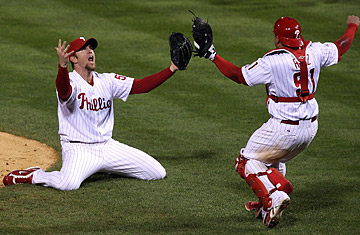
The Philadelphia Phillies celebrate the final out of their 4-3 win to clinch the 2008 World Series against the Tampa Bay Rays
(2 of 2)
It's not just baseball's popularity that got it such good distribution right out of the batter's box; the league made a major sacrifice to get into those 50 million homes, realizing that if you can't beat the cable powers, you might as well join them. Unlike the NFL, baseball offered the pay-TV operators minority ownership of the network. Satellite provider DirecTV owns 16.5% of the MLB Network, while the three largest cable companies — Comcast, Time Warner Cable and Cox Communications — together own another 16.5%. Major League Baseball owns the remaining two-thirds. "We watched the path that the NFL Network took, and we decided to take a different one," says Brosnan. "We decided early on that we'd be open to the possibility of giving ownership stakes to the operators to get distribution."
Though other large operators, like Charter Communications and Cablevision, don't have a stake, they agreed to carry the channel after the big boys signed on. Thanks to baseball's rather inexpensive asking price, companies have been more willing to play ball with MLB. Baine says that while the NFL demanded an 85 cents-per-subscriber fee from operators to carry its network, baseball asked for a more reasonable 25 cents. The network will appear on the basic digital tier of every major provider except for the Dish Network. "No one is going to get 50 million homes out of the cable operators again," Brosnan boasts.
He may be right. But some analysts believe baseball's business decisions will cost the sport down the road. "They gave up too much equity," says Marc Ganis, president of SportsCorp Ltd., a consulting firm. "The initial wide distribution is a great short-term benefit. But it's almost like they're assuming they would not have grown. They could have gotten into 50 million homes and beyond without sacrificing one-third of the ownership. Major sports programming is something viewers will always find."
When defending the merits of its strategy, baseball throws a different pitch. "It would take an awfully long time to grow to the value that being in 50 million homes is immediately going to provide," says DuPuy. "It makes sense from an economic standpoint, and plus, these companies are partners that will help grow the game, and at the end of the day, that's to everybody's benefit as well." Baseball's bet: in five years, it will have a 66% stake in a network worth $1 billion or more, instead of a 100% cut of a company worth $660 million or less.
But without enough compelling programming, those 50 million households won't keep watching. Baseball's daily rhythms do give the MLB Network an inherent advantage over other single-sport channels. During the season, every team plays almost every night, so fantasy players, stat geeks and casual fans will have a reason to keep tuning in. "Baseball really has so much more going on, day in and day out, than the other sports, especially football," says David Carter, director of the Sports Business Institute at the University of Southern California.
One potential problem is that MLB's excellent website, mlb.com, already satisfies this fix for many fans. For $14.95 per month, you can even watch out-of-market games on the site. Plus, despite baseball's overall economic strength, its television ratings dropped like a sinker last season. Fox's regular-season baseball ratings fell 13%, while ESPN's shrunk 7%, and 15 local networks that broadcast baseball saw double-digit ratings declines for their games. The 2008 World Series, between the Philadelphia Phillies and Tampa Bay Rays, was the least watched in history. In that respect, the new network's timing may be terrible.
What's more, at least the other channels show a steady diet of games, while the MLB Network is slated to show a relatively paltry 26 of them all season. It could still increase that number this season, and it plans to air more games down the road. But for the moment, the channel is contractually restricted from airing games opposite those being broadcast on ESPN, Fox and TBS, baseball's national television partners. Will fans care enough about documentaries, shop talk and game highlights that they can get from ESPN — and from ESPN personalities they've become attached to — to turn into devoted viewers of the MLB Network?
Even Petitti, the new network CEO, admits he's a bit nervous about winning viewers' loyalty. In the MLB Network's bustling Secaucus studios, Petitti can't contain his energy, asking employees to show him the latest screen graphics and alternate lighting angles. "Because we're launching into more homes than any network ever has, we've got to be more ready," Petitti says from his corner office. "We have a responsibility to make it feel like we've been around awhile on day one." In other words, the MLB Network can't afford too many rookie mistakes, or else it might be spending a long time in the media minors.
Read TIME's Top 10 Olympic moments of 2008.
Read TIME's 2004 cover story on the Boston Red Sox' winning their first World Series in 86 years.
